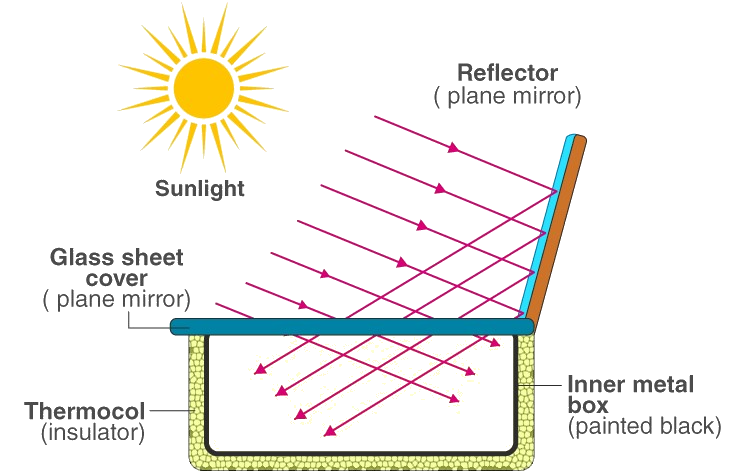Solar Cooking

Introduction to Solar Cooking
A solar cooker, also known as a solar oven, is a device that utilizes the power of sunlight to cook food. It harnesses solar energy and converts it into heat, allowing for sustainable and environmentally friendly cooking. Solar cookers come in various designs and can be used in both rural and urban areas where sunlight is abundant.
Question 1: What is a solar cooker?
a) A device that uses wind energy to cook food
b) A device that uses sunlight to cook food
c) A device that uses fossil fuels to cook food
Answer: b) A device that uses sunlight to cook food
Types of Solar Cookers
There are different types of solar cookers, each with its unique design and functionality:
- Box Cookers: Box cookers are the most common type of solar cookers. They consist of an insulated box with a transparent lid that traps sunlight and converts it into heat.
- Parabolic Cookers: Parabolic cookers use a parabolic-shaped reflector to concentrate sunlight onto a focal point, generating high temperatures suitable for cooking.
- Solar Panel Cookers: Solar panel cookers are portable and lightweight. They use reflectors to direct sunlight onto a dark cooking pot or container.
Question 2: What are the different types of solar cookers?
a) Box Cookers, Wind Cookers, Solar Panel Cookers
b) Box Cookers, Parabolic Cookers, Solar Panel Cookers
c) Solar Panel Cookers, Wind Cookers, Parabolic Cookers
Answer: b) Box Cookers, Parabolic Cookers, Solar Panel Cookers
How Solar Cookers Work
Solar cookers work by harnessing sunlight and converting it into heat energy. The basic principle involves:
- Trapping Sunlight: The solar cooker’s design allows it to capture and retain sunlight, preventing the heat from escaping.
- Converting Sunlight into Heat: The sunlight is absorbed by dark-colored materials or reflected onto a cooking vessel, converting the light energy into heat energy.
- Retaining Heat: The cooker’s insulation helps retain the generated heat, ensuring efficient cooking even when sunlight is momentarily blocked.
Question 3: What is the first step in solar cookers’ operation?
a) Converting sunlight into heat
b) Retaining heat
c) Trapping sunlight
Answer: c) Trapping sunlight
Advantages of Solar Cookers
Solar cookers offer several advantages:
- Environmentally Friendly: Solar cookers produce zero greenhouse gas emissions and reduce reliance on fossil fuels, making them eco-friendly.
- Cost Savings: Solar cookers utilize free energy from the sun, reducing the need for traditional cooking fuels and lowering costs.
- Sustainability: Solar cookers contribute to sustainable living by promoting the use of renewable energy and reducing deforestation associated with traditional cooking fuels.
Question 4: What is one of the advantages of solar cookers?
a) Increased reliance on fossil fuels
b) Cost savings
c) Greenhouse gas emissions
Answer: b) Cost savings
Limitations of Solar Cookers
Solar cookers also have some limitations:
- Weather Dependency: Solar cookers rely on sunlight, so their performance can be affected by cloudy or rainy weather.
- Cooking Time: Solar cookers generally take longer to cook compared to conventional stoves, especially on days with limited sunlight.
- Food Quantity: The cooking capacity of solar cookers may be limited, making it challenging to prepare large meals.
Question 5: What is one of the limitations of solar cookers?
a) Weather independence
b) Fast cooking time
c) Limited cooking capacity
Answer: c) Limited cooking capacity
Conclusion
Solar cookers are an innovative and sustainable solution for cooking food using solar energy. They offer numerous benefits, such as reduced environmental impact and cost savings. Despite their limitations, solar cookers play a vital role in promoting clean and renewable energy for cooking purposes.
Case Studies
Well Done !